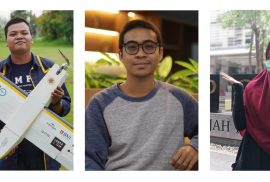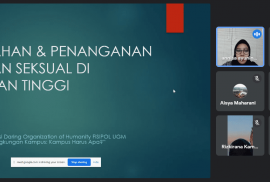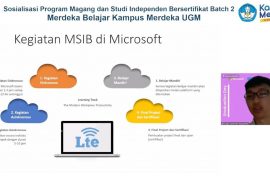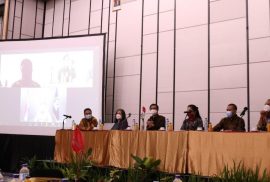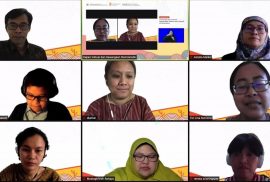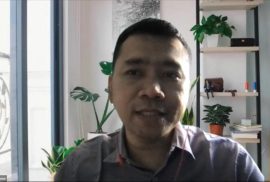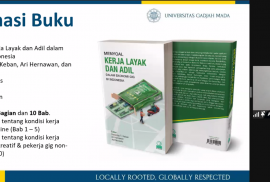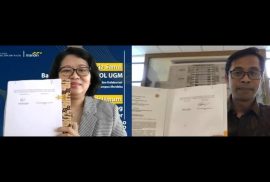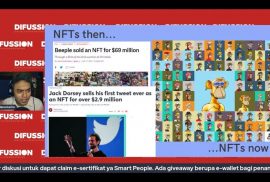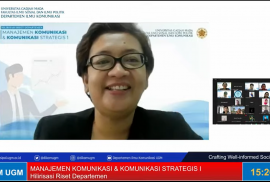A similar achievement from the same department was made by Satria Setya Wibawa. Equipped with communication studies knowledge, he won three championships in the film category. He won first place in the Spectrum Fisip UNS 2021 Short Movie Championship, first place in FETEPERS FKIP ULM 2021 short education movie championship as well as third place and voters-favorite winner in the Agriploxion 2021 short video championship. Satria also created a film community with members from many different universities. This community is aimed to be a place of discussion, collaboration, and a group to enter and win championships.
“Sexual violence cases are revealed more often these days. These cases create a sense of worry and it happens, ironically, in the academic environment” Annisa said, in an event moderated by Gilang Irfan Anshori, a student of the Faculty of Social Development and Welfare UGM.
These kinds of discussions can facilitate the rise of awareness regarding sexual violence, especially in universities.
According to the speakers, the sexual violence cases in universities arose because of many factors such as a power relations imbalance, the lack of legal protection in universities, and the need to protect the reputation of a university which makes the victim’s demand for justice more difficult.
Yogyakarta, January 6th 2022─Universitas Gadjah Mada together with the Merdeka Indonesia Jaya Campus held a Socialization of the Batch 2 of Independent Study Program for Internship and Certified Independent Studies (MSIB) at Kampus Merdeka of 2022 on Thursday (6/1). The event, which took place through Zoom Meeting, invited several MSIB Batch 1 students to share their experiences.
The Independent Campus Program by the Ministry of Education and Culture is an opportunity for students to take part in cross-study and cross-campus learning. Apart from being able to convert up to 20 credits into credits, this program also provides a certain amount of money at the end of the implementation. The program registration and selection process is carried out through the official website of the Kampus Merdeka, kampusmerdeka.kemdikbud.go.id, including uploading the required documents.
Yogyakarta, December 30th 2021─Faculty of Social and Political Sciences (Fisipol) Universitas Gadjah Mada (UGM) in collaboration with the People’s Consultative Assembly of the Republic of Indonesia (MPR RI) held a discussion with the theme “Consolidating Democracy and Strengthening the Ideology of Pancasila”. The event, which was held in a hybrid way (online and offline), at the Ballroom of Novotel Suites Yogyakarta Malioboro and the Zoom Meeting virtual room, presented speakers consisting of academics and political practitioners from the MPR and DPR RI. The event was opened by MC Debora Putri and then the discussion was guided by a lecturer from the Department of Politics and Government (DPP) of Fisipol UGM, Joash Tapiheru. The Dean of Fisipol UGM, Wawan Mas’udi, and the Deputy Chair of the Indonesian People’s Consultative Assembly, Ahmad Basarah, gave a speech at this event.In his speech, Wawan explained that the discussion with the MPR RI aimed to examine the issue of democracy in Indonesia. According to Wawan, the substantive aspect, namely the ideology of Pancasila, is important to consider when discussing democracy.
Yogyakarta, December 14th 2021─FISIPOL UGM’s Social Inclusion and Democratic Society Analysis Team held a research dissemination event titled “Challenges and Potential of Tolerant and Inclusive Society in West Java” on Tuesday (14/12). The event held through Zoom Meeting was attended by Dr. Wawan Mas’udi (Dean of FISIPOL UGM) as the head of the research team and two respondents which were Dr. Diah Kusumaningrum (FISIPOL UGM) and Renata Arianingtyas, MA (The Asia Foundation).
Since March 2020, FISIPOL UGM Social Inclusion and Democratic Society Analysis Team have been doing research which maps the challenges and potential of the creation of an inclusive and tolerant society in Indonesia with the help of International Center for Local Democracy (ICLD). The research was based on a concern for the development of democracy in Indonesia which still lags in its substantive aspect.
Yogyakarta, December 13th 2021─FISIPOL UGM’s Unit of Academic Innovation held a Lecturer Workshop Series with the theme of “University Innovation Assessment” on Monday (13/12). The event was done through Zoom Meeting and invited Grendi Hendrastomo, Pedagogy Expert as well as lecturer from Yogyakarta State University as the speaker. The event was held due to the concern from FISIPOL UGM lecturers about the output assessment method of university tasks.
On this occasion, Grendi talked about assessment development and student activity based scoring according to the learning objective. According to him, an assessment is a process of gathering proofs as a way to create a decision related to the learning outcomes in line with the learning objectives that are being measured. Assessments are aimed to help increase learning productivity, determine learning outcomes, and evaluate the learning quality. The assessment principles are validity, justice, objectivity, thoroughness, continuity, openness, and meaning.
Yogyakarta, December 10th 2021─Institute of Governance and Public Affairs Master of Public Administration or IGPA MAP UGM, launched the latest dissemination results in the form of a book on Friday (10/12). The launch of the book entitled “Questioning Decent and Fair Work in the Gig Economy in Indonesia” is also a new step for one of the current focus issues of IGPA MAP UGM, which is the digital economy, especially the gig economy.
The ceremonial officially launched with a speech from Ely Susanto, this book published by IGPA Press consists of two parts. In chapters one to five, the authors under the umbrella of the first part “The Influence of Platforms, Sharing Economy, and Partnership Relationships on Eligibility & Fairness of Work for Online Ojek Drivers” attempt to specifically review the working conditions of online motorcycle taxi drivers. This 224-page book also tries to explain the conditions of workers in creative industries and non-platform gig workers in the second part entitled “The Impact of Market Logic on Vulnerability of Creative Workers, Musicians, and Garment Workers” which covers chapters six to ten.
Yogyakarta, December 9th 2021─The Dean of the Faculty of Social and Political Sciences (FISIPOL) of Universitas Gadjah Mada (UGM), Wawan Mas’udi, signed a cooperation agreement with Bank Mandiri in the “Ceremonial Cooperation of Bank Mandiri with FISIPOL UGM”.
“The campus is undergoing changes so that students have the opportunity to acquire knowledge and skills, not only in the classroom,” said the Dean of the Faculty of Social and Political Sciences UGM.
Wawan explained that the collaboration with Bank Mandiri would provide students with new work experience and knowledge. He hoped that students can reflect on this knowledge and experience to complete the final project. This collaboration also oversees the learning process of students who will do internships at Mandiri. The Dean said that the internship assessment will not only come from the campus, but also from Bank Mandiri.
Yogyakarta, December 9th 2021─Center for Digital Society of UGM together with the Student Executive Board of the Faculty of Economics and Business, University of Lampung held a Diffusion #66 webinar entitled “About NFT: Future or Moment?” on Thursday (9/12). The event, which took place via the CfDS UGM YouTube streaming, presented speakers Perdana Karim (Research Assistant CfDS) and Muhammad Naufal (Coinvestment Analyst).
NFT or Non-Fungible Token is a blockchain-based digital asset that certifies ownership of the asset. This NFT will start to boom in 2021. As the name implies, NFT is a token that is quite unique because of its irreplaceable nature. Therefore, there will only be one item with a high value and makes NFT seem very expensive. NFT itself can be an alternative for artists to sell their work online.
Yogyakarta, December 9th 2021─The Department of Communication Studies (Dikom) of Faculty of Social and Political Sciences of Universitas Gadjah Mada held a Department Research Downstream forum to convey the research results of lecturers together with undergraduate and postgraduate students of the Department of Communication Studies of FISIPOL UGM to the wider community.
The forum is divided into two sessions. The first session carried the theme “Journalism and Communication Policy”, while the second session discussed the theme “Communication Management and Strategic Communication”. In the first session, which was led by a Lecturer of the Department of Communication Studies, Muhammad Sulhan, there were four speakers who presented their research material.

